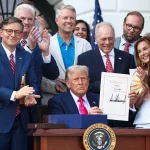The relationship between former President Donald Trump and the Federal Bureau of Investigation (FBI) has long been one of tension, public controversy, and political warfare. That conflict is now resurfacing in the form of a high-profile lawsuit filed by several former FBI officials who claim they were targeted with retaliation by the Trump administration.
- Background of the Lawsuit
- The Plaintiffs’ Allegations
- Legal and Constitutional Dimensions
- Trump’s Response and Supporters’ View
- Public and Political Reactions
- Historical Context of Presidential Retaliation
- Expert Perspectives on the Case
- Implications for the Future of Federal Institutions
- FAQs
- Who are the former FBI officials filing the lawsuit against Trump?
- What are the main allegations in the lawsuit?
- How has Trump responded to the lawsuit?
- Could this lawsuit set legal precedent?
- What impact could the case have on future administrations?
- Conclusion
According to the plaintiffs, the White House and Department of Justice used political pressure, public smears, and institutional power to punish officials who were either perceived as disloyal to Trump or directly involved in investigating his 2016 campaign’s ties to Russia.
The case has sparked widespread debate about the balance of executive power, the independence of federal law enforcement, and the dangers of politicizing intelligence agencies. Legal analysts suggest that the lawsuit could set precedent for how former government officials can pursue claims against administrations accused of abuse of power. At the same time, Trump’s allies dismiss the suit as yet another attempt to revive what they call a “witch hunt” against the former president.
This unfolding legal battle brings into focus a broader question: what does accountability look like for a former president accused of using the federal government to exact personal revenge?
Background of the Lawsuit
The lawsuit was filed by multiple former FBI officials who held senior positions during the Trump administration. Among the most recognizable names are individuals who either played roles in the Russia investigation or were publicly criticized by Trump during his presidency. Their claims revolve around allegations of targeted retaliation, unlawful termination, reputational harm, and violations of constitutional rights.
Trump’s presidency was marked by an unrelenting criticism of the FBI, particularly after the agency began investigating Russian interference in the 2016 election. Trump accused FBI leaders of being part of a so-called “deep state” conspiracy to undermine his presidency. Publicly, he called certain FBI officials “traitors” and “bad cops,” while behind the scenes, critics argue, his administration took steps to sideline and punish those officials.
The lawsuit contends that these retaliatory measures were not only politically motivated but also unlawful, violating First Amendment protections, due process rights, and federal statutes designed to safeguard public servants from political retaliation.
The Plaintiffs’ Allegations
According to court filings, the former FBI officials argue that they faced both professional and personal consequences as a direct result of Trump’s public campaign against them. Many claim they were forced out of their positions prematurely, damaging lifelong careers in public service. Others assert that Trump’s public attacks destroyed their reputations, making it nearly impossible to work in law enforcement, private security, or academia after leaving government.
For example, the plaintiffs allege that Trump frequently pressured the Department of Justice to investigate or prosecute individuals who had worked on the Russia probe. They also point to Trump’s use of Twitter, campaign rallies, and press conferences as platforms to single them out by name, labeling them as corrupt or disloyal. Legal experts say this created an environment of hostility, where these officials became symbols of Trump’s grievances rather than public servants performing their duties.
One particularly striking aspect of the complaint is the claim that the administration engaged in what the plaintiffs describe as “weaponized leaking,” where sensitive information was selectively released to discredit individuals associated with the Russia investigation. They argue this was a deliberate tactic to intimidate not only them but also current and future government employees who might resist political pressure.
Legal and Constitutional Dimensions
The case raises profound constitutional questions. Can a sitting president, or a presidential administration, use the powers of office to retaliate against career officials without consequence? And what legal recourse do those officials have once they are removed from power?
Legal scholars suggest that this lawsuit could test the boundaries of presidential immunity. While Trump no longer holds office, his actions during his presidency are at the center of the allegations. Courts will need to determine whether actions taken under the guise of presidential authority can be litigated in civil courts once a president leaves office.
The plaintiffs’ attorneys argue that constitutional protections, particularly under the First Amendment, shield government employees from being punished for their political views or for carrying out official duties that a president dislikes. If the court sides with the plaintiffs, it could reinforce the principle that no president is above the law, even when it comes to dealing with career officials in the executive branch.
Trump’s Response and Supporters’ View
As expected, Trump and his allies have dismissed the lawsuit as politically motivated. In statements released by his representatives, Trump has argued that the former FBI officials were part of an effort to undermine his presidency and that his criticisms of them were justified. His supporters contend that these officials abused their power by pursuing investigations into his campaign that were based on flawed intelligence.
Many conservative commentators view the lawsuit as a continuation of what they call the “Russia hoax,” suggesting that the plaintiffs are trying to rewrite history by portraying themselves as victims instead of as participants in an overreaching investigation. Some argue that presidents have wide discretion in shaping executive branch leadership and that Trump’s actions fall within the scope of his lawful authority.
Public and Political Reactions
The lawsuit has reignited partisan divisions in Washington. Democratic lawmakers have praised the former FBI officials for standing up against what they describe as “unprecedented presidential abuse of power.” Some Democrats argue that this lawsuit highlights why reforms are needed to strengthen protections for whistleblowers and career officials who serve under administrations of both parties.
On the other side, Republicans have largely rallied to Trump’s defense, framing the lawsuit as a politically timed maneuver designed to damage Trump’s 2024 campaign and beyond. GOP leaders have also raised concerns about setting a precedent that could invite endless litigation against former presidents.
Polling data suggests that public opinion remains deeply divided. A recent survey found that 54% of Americans believe Trump unfairly targeted the FBI during his presidency, while 40% believe his criticism of the agency was justified. These numbers mirror the partisan polarization that has defined most debates surrounding Trump’s actions while in office.
Historical Context of Presidential Retaliation
While the Trump-FBI feud is unique in scale and publicity, history is filled with examples of presidents clashing with federal agencies. Richard Nixon famously tried to use the FBI and IRS against political enemies, and his actions ultimately contributed to his downfall. More recently, presidents from both parties have expressed frustrations with intelligence agencies, though few went as far as Trump in publicly attacking career officials.
The lawsuit against Trump draws parallels to Watergate-era abuses, raising questions about whether safeguards put in place after Nixon’s resignation were enough to prevent future presidential overreach. Some historians argue that Trump’s behavior illustrates how fragile institutional norms can be when a president chooses to break them.
Expert Perspectives on the Case
Legal experts are divided on the potential outcome of the case. Some believe the plaintiffs face an uphill battle because courts are often reluctant to second-guess presidential decisions, particularly when they involve personnel or national security matters. Others argue that the sheer volume of public statements made by Trump could bolster the plaintiffs’ claims, as they provide direct evidence of retaliatory intent.
Former federal prosecutor Jennifer Rodgers explained in an interview that “courts generally give presidents wide latitude when it comes to shaping the executive branch, but what makes this case different is the clear pattern of public and private retaliation that appears motivated by personal animus rather than legitimate policy disagreements.”
Implications for the Future of Federal Institutions
The outcome of this lawsuit could have far-reaching implications for the independence of federal institutions. If the plaintiffs succeed, it could strengthen protections for career officials and reinforce the principle that law enforcement must remain insulated from partisan politics. If they fail, critics warn, it could embolden future presidents to target civil servants who do not align with their political agenda.
This case also intersects with broader concerns about political polarization and public trust in government. The FBI, once seen as a largely apolitical institution, has become a lightning rod for partisan disputes. Restoring faith in such institutions will likely require not only legal clarity but also political leadership committed to preserving their independence.
FAQs
Who are the former FBI officials filing the lawsuit against Trump?
The plaintiffs include several former high-ranking FBI officials who were directly involved in sensitive investigations during the Trump presidency. While some names are already public, others are being withheld for privacy and security reasons.
What are the main allegations in the lawsuit?
The lawsuit alleges that the Trump administration engaged in targeted retaliation against FBI officials, including wrongful termination, reputational harm, and public smears. The plaintiffs claim these actions violated constitutional rights and federal laws.
How has Trump responded to the lawsuit?
Trump and his allies have dismissed the case as politically motivated. They argue that the former FBI officials were biased against him and that his criticisms were justified given the circumstances surrounding the Russia investigation.
Could this lawsuit set legal precedent?
Yes. Legal scholars note that this case could shape the boundaries of presidential power and the extent to which former government officials can hold administrations accountable for alleged abuses of authority.
What impact could the case have on future administrations?
If successful, the lawsuit could strengthen safeguards for career officials and limit a president’s ability to retaliate against perceived enemies. If unsuccessful, it might embolden future administrations to exert more political pressure on federal agencies.
Conclusion
The lawsuit filed by former FBI officials against the Trump administration represents more than just a clash of personalities; it is a pivotal legal battle over the limits of presidential power and the independence of federal institutions. At stake is not only the reputations of the plaintiffs or the legacy of Donald Trump, but also the broader question of whether the American system of government can effectively prevent abuses of executive authority.
As the case moves forward, it will test the resilience of the rule of law and determine how far accountability extends for presidents who seek to use their office as a tool of retaliation. Regardless of the outcome, the lawsuit underscores a critical truth: the health of American democracy depends on protecting public servants from political persecution and ensuring that no leader, no matter how powerful, is above the law.








